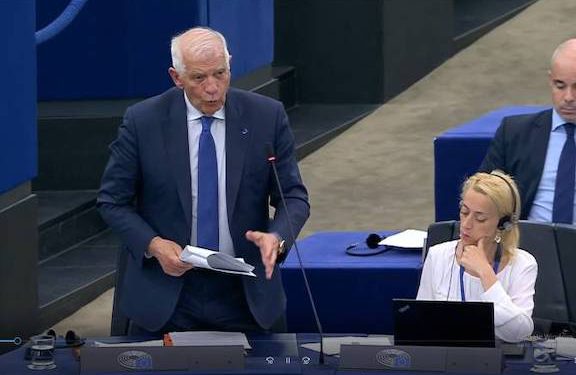By Asbarez | Friday, 16 June 2023

The European Union’s foreign affairs chief, Josep Borrell, said Azerbaijan’s checkpoint installed at the Lachin Corridor runs counter to efforts to build trust between Armenia and Azerbaijan.
“Azerbaijan’s unilateral decision to install this checkpoint completely contradicts efforts to build trust between the parties,” said Borrell, who was asked on Tuesday by a European Parliament Member Francois Xavier Bellamy about the EU inability to condemn Baku for its action, Armenpress reported.
“The Court of Justice has condemned the blockade by Azerbaijan, but this state terrorism has not led to any sanctions by the Council, and the Commission seems unable to properly condemn this very serious violation of the fundamental rights of the people of Nagorno-Karabakh,” Bellamy said during a discussion in the European Parliament entitled “Relations between Armenia and Azerbaijan and the situation in Nagorno-Karabakh and the Lachin Corridor.”
“There are territories, border areas with Armenia, from where it can be seen what is happening in the Lachin Corridor, but the corridor itself is outside the jurisdiction of the mission and their area of responsibility. Now we are trying to find a solution for this specific problem,” Borrell said.
According to Borrell, the current situation in the Lachin Corridor certainly raises the concern of the international community, but the EU does not have access to the checkpoint located in the corridor, therefore it is deprived of the opportunity to carry out a full observation.
“The EU is interested in the establishment of peace in the South Caucasus, and for this purpose it implements initiatives of a humanitarian nature, as well as contributes directly to the negotiations aimed at peace. We are also involved in finding missing persons during the conflict and keeping the conflicting parties away from new clashes,” Borrell said.
In response to Bellamy’s question, Borrell said that efforts are underway to resolve the Armenian-Azerbaijani conflict and the parties have also expressed readiness to continue negotiations.
Borrell emphasized that a very important meeting between the French President, the German Chancellor, the President of the European Council and leaders of Armenia and Azerbaijan took place in Moldova recently.
The meeting mentioned by Borrell did not result in a condemnation by EU leaders of Azerbaijan for its illegal breach of agreements and threats to the lives of Armenians in Artsakh.
Yet the EU’s foreign policy chief invoked statements made following recent meetings between Prime Minister Nikol Pashinyan and President Ilham Aliyev of Azerbaijan as signs of progress.
Borrell referred to announcement by Pashinyan and Aliyev to recognize each other’s territorial integrity, as well as Pashinyan’s later remarks where he said that Armenia has accepted Artsakh as a constituent part of Azerbaijan as a signal to Azerbaijan to pay more attention to the rights and security issues of the people of Karabakh.
“We hope that the message of the Armenian side will be an incentive, pushing the negotiation process to a positive direction,” Borrell said.
The EU’s top diplomat also said that the EU mission in Armenia is part of the peace process between Armenia and Azerbaijan, but it cannot completely replace the process. The only solution, he said, is within the diplomatic sphere.
“The conflicting parties have expressed their desire to continue the negotiations, and the next meeting will be held in Brussels, from which the EU has high expectations,” Borrell said.
He noted that the socio-economic situation in Nagorno-Karabakh is quite serious, which is why the EU has implemented various initiatives in the last two years to provide humanitarian support to the local residents, explaining that 70 million euros have already been allocated for this purpose.
Borrell said that the humanitarian support was aimed at solving health problems, including providing medical equipment and providing social support to people affected by the conflict. Borrell emphasized that there is still a lot to be done in that area.
comments
Armenia Has Become Largest Buyer of Indian Weapons
ARF AU Statement: In solidarity with Tavush
OPED: The Beginning of a New Struggle
Already Scarce Bread to be Rationed in Artsakh Due to Blockade
Artsakh Political Factions Agree On New President
Pashinyan Warns International Community of New Azerbaijani Attacks Against Armenia, Artsakh
Artsakh Students, Kidnapped by Azerbaijan, Released into Armenian Custody
Artsakh Says Azerbaijan’s Demands Further Complicate Situation